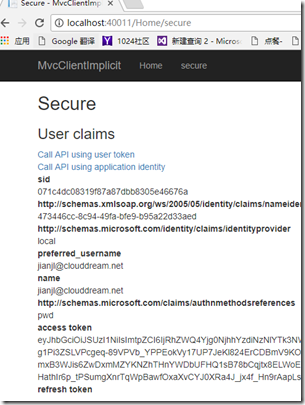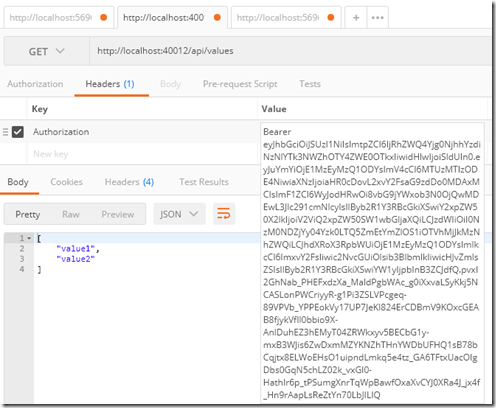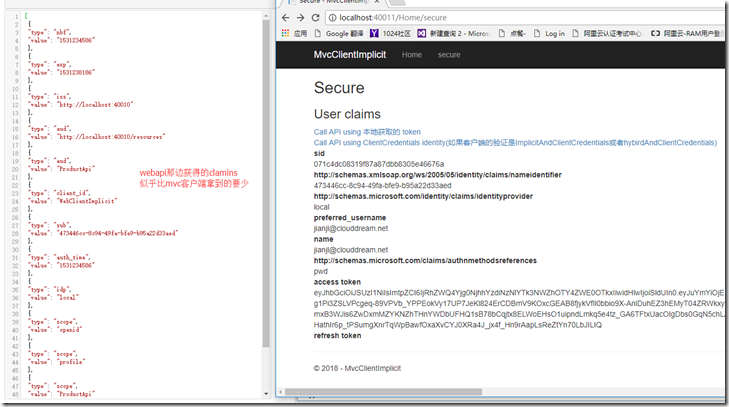.net core Identity集成IdentityServer4 (1)基本操作
一. 新建asp.net core identity项目
新建项目->asp.net core web应用程序-> web应用程序(模型视图控制器)&更改身份验证为个人.
新建一个空数据库, 然后在appsettings中的连接字符串指向该空库.
"DefaultConnection": "Data Source=.;Initial Catalog=IdentityDBTest;Integrated Security=False;Persist Security Info=False;User ID=sa;Password=sa1234;MultipleActiveResultSets=True;Pooling=True;Min Pool Size=1;Max Pool Size=300;"
cmd进入项目根目录, 然后执行 dotnet ef database update -c ApplicationDbContext
会在指定的空库中创建Identity的相应数据表.
修改launchSettings的Project执行方式的url为 http://localhost:40010
在Startup.cs中添加如下代码, 配置asp.net core identity的用户相关信息
public void ConfigureServices(IServiceCollection services) { services.AddDbContext<ApplicationDbContext>(options => options.UseSqlServer(Configuration.GetConnectionString("DefaultConnection"))); services.AddIdentity<ApplicationUser, IdentityRole>() .AddEntityFrameworkStores<ApplicationDbContext>() .AddDefaultTokenProviders(); services.Configure<IdentityOptions>(options => { // Password settings options.Password.RequireDigit = false; options.Password.RequiredLength = 6; options.Password.RequireNonAlphanumeric = false; options.Password.RequireUppercase = false; options.Password.RequireLowercase = false; //options.Password.RequiredUniqueChars = 6; // Lockout settings //options.Lockout.DefaultLockoutTimeSpan = TimeSpan.FromMinutes(30); //options.Lockout.MaxFailedAccessAttempts = 10; //options.Lockout.AllowedForNewUsers = true; // User settings options.User.RequireUniqueEmail = true; }); services.ConfigureApplicationCookie(options => { // Cookie settings options.Cookie.Name = "identityCookieJJL"; options.Cookie.HttpOnly = true; options.ExpireTimeSpan = TimeSpan.FromMinutes(30); // If the LoginPath isn't set, ASP.NET Core defaults // the path to /Account/Login. options.LoginPath = "/Account/Login"; // If the AccessDeniedPath isn't set, ASP.NET Core defaults // the path to /Account/AccessDenied. options.AccessDeniedPath = "/Account/AccessDenied"; options.SlidingExpiration = true; }); // Add application services. services.AddTransient<IEmailSender, EmailSender>();
启动并运行, 注册一个用户, 并且确保登录成功
二. 集成IdentityServer
添加IdentityServer4.aspnetIdentity的Nuget包, 同时会自动添加IdentityServer4.
在根目录下新建一个AuthorizationConfig.cs类.
添加如下代码
/// <summary> /// 哪些API可以使用这个authorization server. /// </summary> /// <returns></returns> public static IEnumerable<ApiResource> ApiResources() { return new[] { new ApiResource("ProductApi", "微服务之产品Api") }; }
public static IEnumerable<IdentityResource> GetIdentityResources() { return new List<IdentityResource> { new IdentityResources.OpenId(), new IdentityResources.Profile() }; }
public static IEnumerable<Client> Clients() { return new[] { new Client { ClientId = "WebClientImplicit", ClientSecrets = new [] { new Secret("SecretKey".Sha256()) }, AllowedGrantTypes = GrantTypes.Implicit, AllowAccessTokensViaBrowser = true, RedirectUris = { http://localhost:40011/signin-oidc }, // where to redirect to after logout PostLogoutRedirectUris = { http://localhost:40011/signout-callback-oidc }, AllowedScopes = new List<string> { IdentityServerConstants.StandardScopes.OpenId, IdentityServerConstants.StandardScopes.Profile, "ProductApi", IdentityServerConstants.ClaimValueTypes.Json } , RequireConsent=false,//不需要确认授权页面,方便直接跳转 AlwaysIncludeUserClaimsInIdToken=true } }; }
在StartUp.cs中的服务注册方法中添加代码
// configure identity server with in-memory stores, keys, clients and scopes //我们在将Asp.Net Identity添加到DI容器中时,一定要把注册IdentityServer放在Asp.Net Identity之后, //因为注册IdentityServer会覆盖Asp.Net Identity的一些配置,这个非常重要。 services.AddIdentityServer() .AddDeveloperSigningCredential() .AddInMemoryPersistedGrants() .AddInMemoryIdentityResources(AuthorizationConfig.GetIdentityResources()) .AddInMemoryApiResources(AuthorizationConfig.ApiResources()) .AddInMemoryClients(AuthorizationConfig.Clients()) .AddAspNetIdentity<ApplicationUser>(); services.AddMvc();
在选暖宝的Configure使用注册项的方法中添加如下代码
// app.UseAuthentication(); // not needed, since UseIdentityServer adds the authentication middleware app.UseIdentityServer();
接下来使用命令dotnet run启动项目
三. 新建地址为http://localhost:40011/的asp.net core mvc项目, 命名为MvcClientImplict
新建项目的方法和上面的.net core identity一样, 只是不需要个人验证. 修改launchSettings的端口是40010, 对应identityserver的配置url
nuget获取 identitymodel
public void ConfigureServices(IServiceCollection services) { services.AddAuthentication(options => { options.DefaultScheme = "Cookies"; options.DefaultChallengeScheme = "oidc"; }) .AddCookie("Cookies") .AddOpenIdConnect("oidc", options => { options.SignInScheme = "Cookies"; options.Authority = "http://localhost:40010"; options.RequireHttpsMetadata = false; //options.ResponseType = "id_token code"; options.ResponseType = "id_token token"; options.ClientId = "WebClientImplicit"; options.SaveTokens = true; options.ClientSecret = "SecretKey"; options.Scope.Add("ProductApi"); //options.Scope.Add("offline_access"); options.GetClaimsFromUserInfoEndpoint = true;// }); services.AddMvc(); }
下面也别忘了 app.UseAuthentication()
运行并验证授权成功成功
四. 新建一个webApi(端口40012), 配置受到identityserver的保护
nuget :IdentityServer4.AccessTokenValidation
public void ConfigureServices(IServiceCollection services) { services.AddAuthentication("Bearer") .AddIdentityServerAuthentication(option => { option.Authority = "http://localhost:40010";//这里填写/.well-known/openid-configuration里看到的issuer option.RequireHttpsMetadata = false; option.ApiName = "ProductApi"; option.ApiSecret = "SecretKey"; }); services.AddMvc(); }
app.UseAuthentication();
在默认的api上添加验证
[Authorize]
[Route("api/[controller]")]
public class ValuesController : Controller
{
在webapi里面新建一个 controller
[Route("api/[controller]")] [Authorize] public class IdentityController : ControllerBase { [HttpGet] public IActionResult Get() { return new JsonResult(from c in User.Claims select new { c.Type, c.Value }); } }







